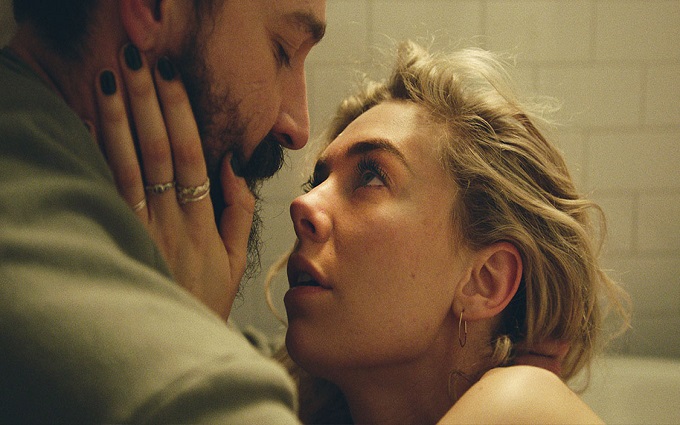Pieces of A Woman Review TIFF 2020

The Plot
An unblinking account of a young couple from different backgrounds navigating the most painful loss imaginable when the planned home birth of their first child spirals into unspeakable tragedy.
The Good
At a time when the cinematic landscape is so often dominated by fantastical special effect fuelled escapism, this film immediately feels like a more raw form of powerfully simple human drama.
Traumatic childbirth and the loss of a child is something so taboo and deeply unsettling that there isn’t actually a word in the English language to describe this kind of loss. Giving that nameless and all too often unspoken pain a voice in this unflinching intimate dramatization is perhaps an important step in destigmatizing the ocean of grief and confusion it creates.
While for many it will be utterly daunting to confront this horror on screen, it may offer audience at least some hope of comprehending the experience of families who survive this ordeal and for those who have it may serve as a chance for catharsis.
Shia LaBeouf is a young actor who has emerged from the shadow of his highly publicised personal demons and professional missteps to become a truly compelling and uniquely visceral adult performer. His output in recent years as a director and performer alike have moved miles towards redeeming himself for admitted past failings. Few actors have the capacity for raw blistering anguish that he has so frequently demonstrated in recent performances. It’s difficult at times to believe there was once a time when he was trading poorly scripted quips with dancing CGI robots.
His performance as Sean a working class man evidently haunted by past demons and faced with a furious search for blame and explanations is utterly heart-breaking. It is a truly raw and accurate portrait of the flailing effort to survive. His desperate efforts to maintain some shred of normalcy and protect their relationship from being completely annihilated by grief is utterly agonising viewing. Particularly as it disintegrates into more self-destructive behaviour.
Vanessa Kirby as the other half of this devastated couple has already collected top acting honours in Venice for this performance. As her star continues to rise ceaselessly this is a physically and emotionally demanding performance that showcases the full intensity of her talents. Her performance is devastating and riveting in equal measure. Kirby carries the full crushing weight of her character’s journey in every scene. Her performance is wracked with a more introverted agony than LaBeouf’s performance. While she may at first appear to be irretrievably muted her gradual momentum carries her towards a bravely articulate and cathartic climax.
Veteran acting icon Ellen Burstyn is another vitally important piece of this complex drama, playing Kirby’s strong voiced mother that carries her own weight of desperate expectations and lived experiences into the already nightmarish situation.
The contrast between how these different people process the mountain of grief and unanswerable questions they are inescapably faced with shows the complete spectrum of the human experience of loss. It is a heart-breaking anguished cry torn constantly between fits of rage and totally numb detachment. The fact that it leads eventually towards some form of healing and recovery is an uplifting statement about the power of the human spirit.
The Bad
The subject matter of this unflinching and traumatic piece of filmmaking will likely be simply too difficult to bear for those whose own lives have actually been touched by the most devastating experience of losing a child. While it is perhaps important to have that most extreme form of human suffering explored on screen, it is a daunting prospect for anyone but especially those most vulnerable.
Inevitably some people will seek to use the film as a tool for explicitly highlighting the dangers of ‘home birthing’. Such is the intensely emotive nature of this medical debate that the film will likely also draw fire from those concerned about stigmatizing home birth. They will point to the film being fiction. Either way it’s inescapably inflammatory.
Given the wildly different ways in which people process unimaginable grief in their own lives it’s also inescapable that some people will find it immensely difficult to relate to the different stages of the specific journey these broken characters go through. There is perhaps nothing more alienating and corrosive to our understanding of each other than the way in which we respond to the most extreme trauma.
Even if the film’s ultimate message of the possibility of eventual recovery is of universal appeal, the path the film and these excellent performances maps to reaching it may provoke difficult emotions and dissent among audiences.
The Ugly Truth
Pieces of A Woman is a traumatically powerful examination of one of the most devastating personal traumas human beings can experience. While it will be unbearable for many to watch, those that choose to will at least find some solace in knowing that this kind of pain has been authentically and respectfully dramatized. Perhaps this is most important given how often unspoken this experience is in the lives of real families affected touched by such heartbreak.
Review by Russell Nelson